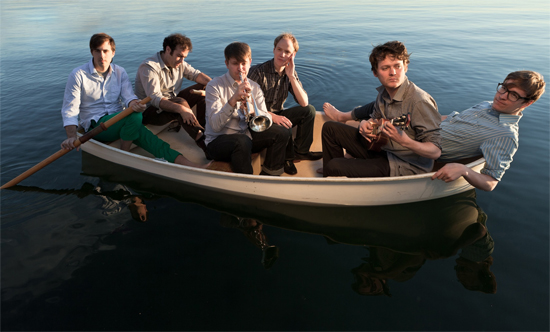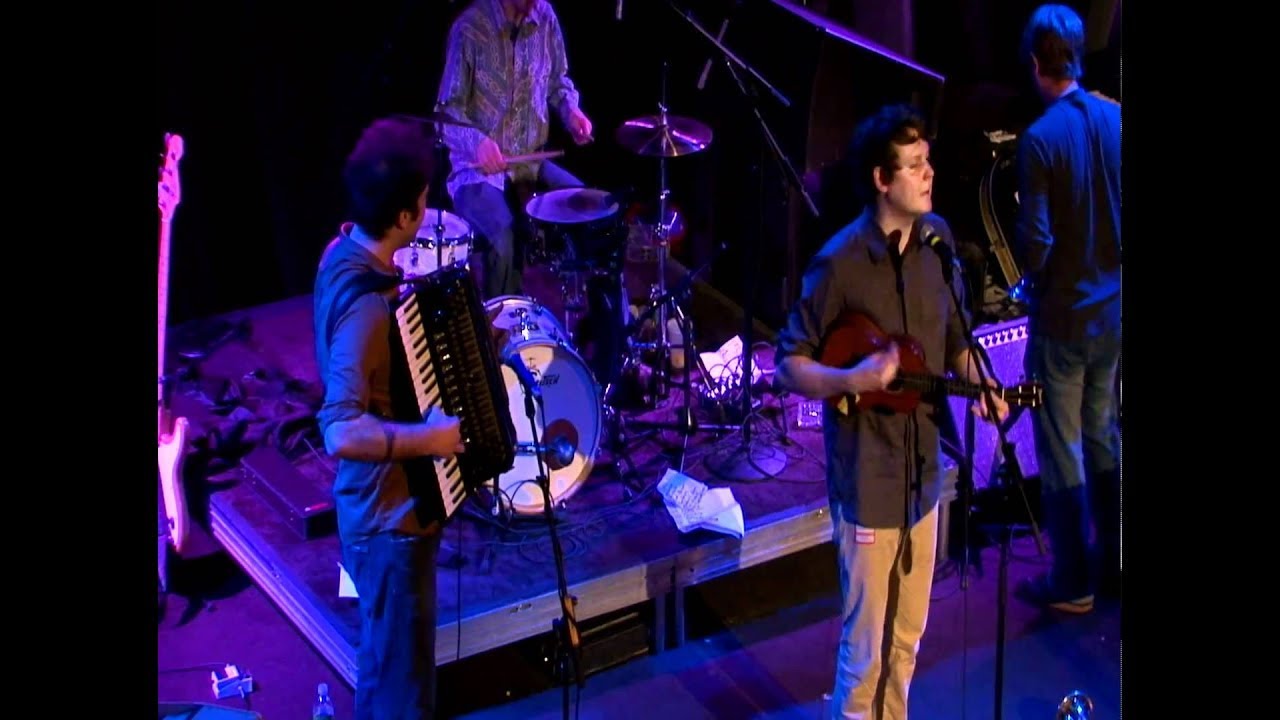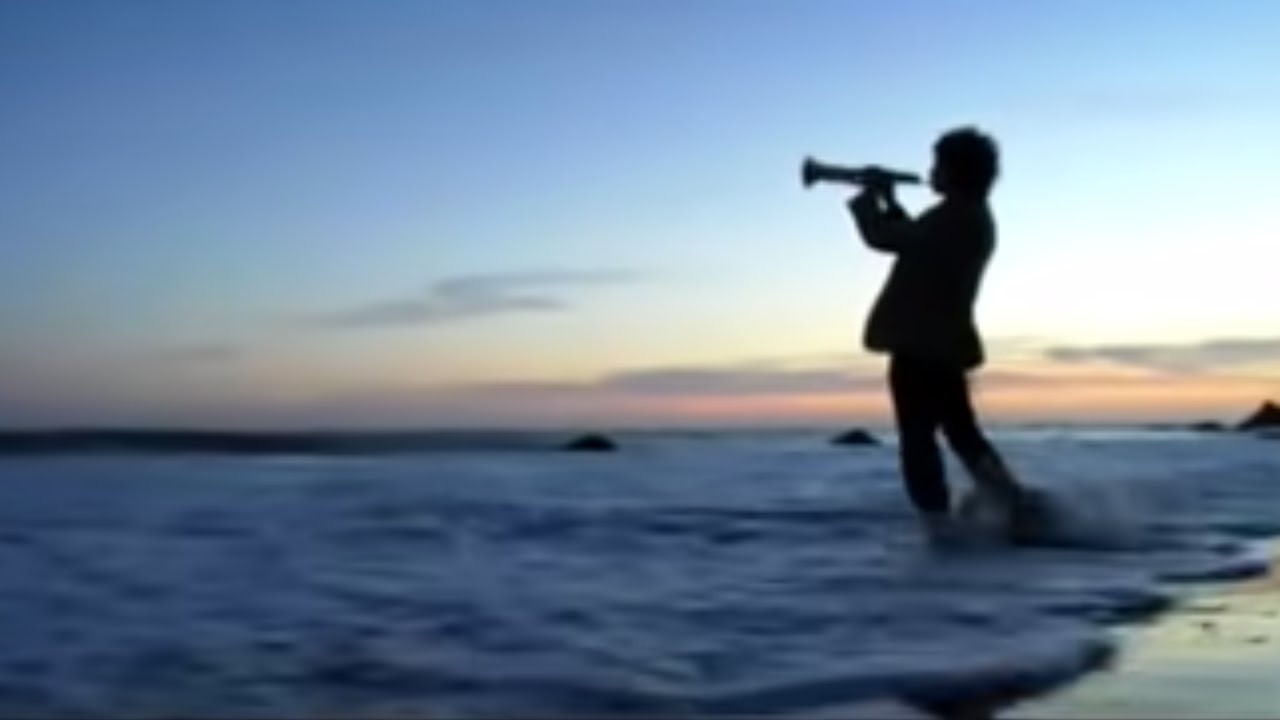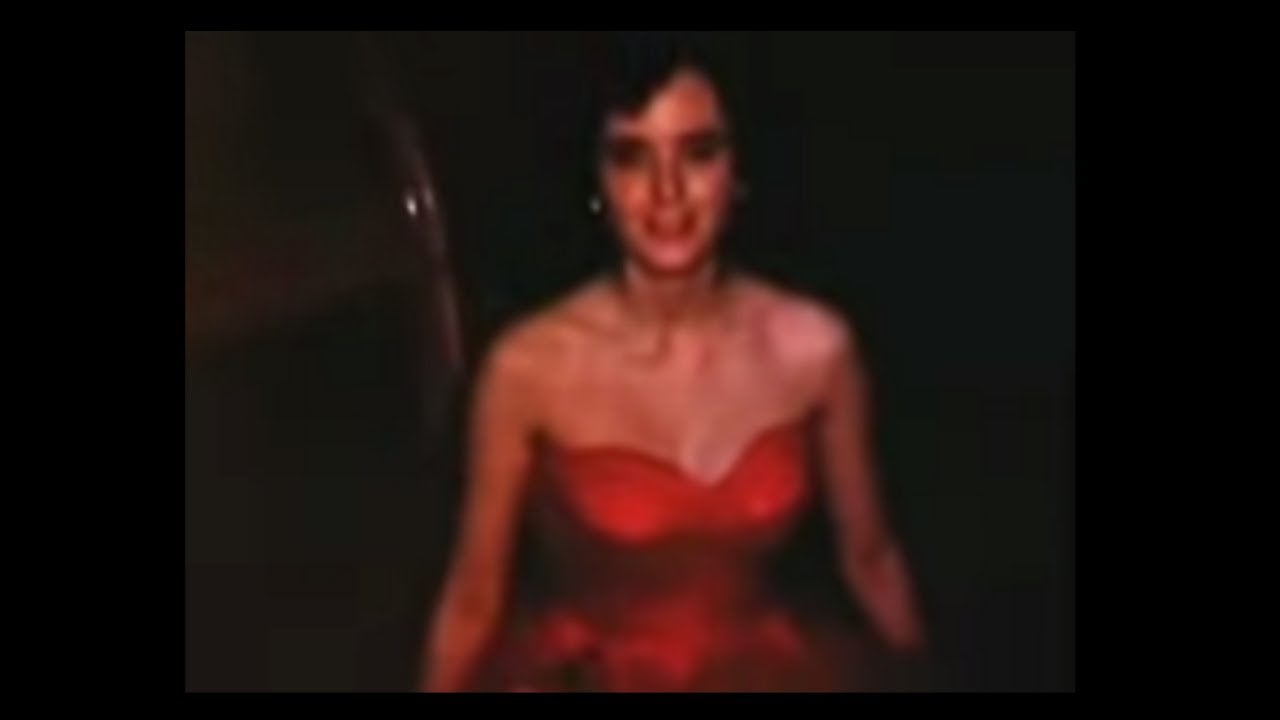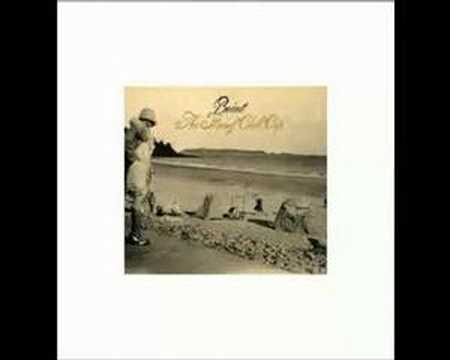Beirut’s Zach Condon has just played the biggest gig of his life, and it shows. The 25-year-old New Mexican is propped up on a stool in a hotel bar, sipping tentatively at a glass of soda water. His black skinny jeans and black suit jacket haven’t changed since the night before when 50,000 people gathered in Hyde Park and saw him support Arcade Fire. It was a big gig for Arcade Fire, but for Beirut it was monstrous: the biggest show they’ve ever played, as well as their first in Europe this year. Now Zach’s jacket is covered in flecks of dust that shake free when he runs a trembling hand through his black bed hair. The smell of whiskey lingers. Our interview is early in the day. Directly afterwards he’ll ask for a toilet break and disappear.
There were moments in his career where it seemed like this kind of thing might never happen. In 2008 an exhausted Zach called off his entire European tour after two strange, brassy albums of romantic Balkan-inflected songs launched him from a bedroom in Sante Fe to stages stretching to the other side of the earth. Afterwards he hid in Oaxaca, Mexico, with a professional brass band who couldn’t play a note of the compositions that became March Of The Zapotec until he’d written each part out by hand. He now speaks of that album as time out from serious writing.
The music of Beirut has always spoken in strange tongues to teenagers fed on sanitary indie. Zach’s fantasy world was coloured with eastern European folk and French cabaret, exotic Mexican sounds and, it emerged, an early output of clunky electronica. It took on a life of its own during ‘Beirutando’ in August 2009, when people gathered with instruments across Brazil and in Lima, Peru, to celebrate the band’s songs. All this for a boy barely out of his teens.
So it comes as some surprise that for his next album The Rip Tide, Zach has stopped name-checking those far-flung musical influences with which he made his name. There are still trumpets and accordions in abundance but the places are his own – Santa Fe, New York – and the theme is sanctuary. Here he tells the Quietus how he learned to make his own rules, and how he finally found home.
How was the show last night? Is there less pressure when you are performing with such huge acts?
Zach Condon: Well yes, that took a lot of pressure off, but there’s this weird disconnect when the audience is above a certain size. If you can’t see the whites of their eyes you’re not so afraid of them. Sometimes a hundred people can be incredibly nerve-wracking, but playing to 6,000, there’s a certain professional approach to it. It’s entirely different. It’s all part of the work.
It’s not frustrating? You didn’t mind?
ZC: No, I didn’t mind. I was just surprised. You have to imagine that this is our first show in England, in Europe, for the year. We haven’t played together for two or three weeks now. So as a first experience it was really quite a shock. I’m actually just happy that we powered through it in such a way.
Did you play new stuff?
ZC: Yeah we did. Three new songs, maybe four.
The new songs seem completely different. You’re not appropriating other sounds so much or adventuring musically. Why is that?
ZC: The funny thing is that I feel like I went back to where I started. I’ve been writing songs since I was 15, and the first album was released when I was 19. It’s almost like the press and the world in general caught me at a strange time. I was musically growing up at such a rapid pace that I was really wearing my influences on my sleeve. It was great experience and I’m proud of [those albums]. I like that youthful, wanderlust element to them and I think that might have resonated with people. But this album was much more back to basics, trying to write what for years has been slowly developing as the Beirut sound, and staying as true to that as possible.
So Gulag Orkestar, Zapotec: these were detours?
ZC: Yeah, totally. There was a lateral movement there. Zapotec was supposed to be quite playful actually, it ended up being taken a bit more seriously than I intended.
From what I read you ended up taking it a bit more seriously than you intended…
ZC: To an extent, yeah, but I always knew that the next effort after that one, the next full length, was going to be a much more focussed and deliberate project. I knew it was going to be big and it was going to take a lot out of me. So Zapotec/Holland was supposed to be this very playful experience where I got to hear my voice on very different palettes of sound and got to work with a professional brass band, which I’ve always dreamed of doing. Especially one with such a unique character to it.
How did you reach a place where you felt more comfortable writing about your home and yourself?
ZC: As an adolescent you just don’t think your story is that interesting, or at least that the way you would express it would come out a little too much like a diary or something, and not something that people can relate with outside small circles. So I would always try to talk about someone else or some character or story. Something to make it feel a little more classic. This time around I knew from the start that I would do something more personal.
Because you felt like people were ready to hear your story?
ZC: Yes. I feel like some strange things have happened to me and there’s still a way to make that relatable.
So some of it is about New York, right? Is that home?
ZC: Brooklyn is. I bought a house. So that’s home, at least for now.
What’s it like?
ZC: It’s peaceful with all the stimulus of a large city.
And you can work there?
ZC: No, I never work there. I always go outside to work. I mean, every now and then I’ll rent a studio to do some work, but I really have to lock myself in the studio. For all the writing and stuff like that I used to always go back to New Mexico. This year I went to a farmhouse about two and half hours north of the city. Alone. It’s in a place called Bethel Woods, which ironically – not on purpose – is literally around the corner from the original Woodstock festival grounds! [Laughs]
That’s going to become some kind of folklore.
ZC: I don’t want it to be! I say that with some trepidation.
Do you feel like you’re at a point where you want to put down roots? You don’t still want to travel and…
ZC: No I’ve reached a place in my life where for my own sanity I need some feeling of home. I’ve lived out of a suitcase for years; I’ve changed apartments, countries, cities. I need to know that when I’m not here working and touring, I have a place to go back to. I need to have that feeling, that sensation, so…
Do you think that was at the root of some of your problems, the touring?
ZC: Yes, that was a big part of it. But actually the first tour that I had to cancel the end of was because I was just saying yes to everything at the time. I never learned how to say no. So I completely exhausted myself.
You’ve stopped doing that?
ZC: [Laughs] I’ve changed the rules. There are a lot of ground rules now for touring. Never longer than two and half weeks, always a day off between shows. Even if it’s only a week off in between and I’m touring for the whole year – two and half weeks tour, week off, two and a half weeks tour, week off.
Do you sustain personal relationships through all this?
ZC: I’m married. She’s here, she comes on some of the more special gigs whether they be a country that we really want to visit, or just a really weird one like last night.
It feels like the album embraces a very classic format with several motifs and themes repeated through the songs. Was that intentional?
ZC: Yeah, almost in every element of writing it. I want something lasting I guess.
Can you think of examples of other classic albums you wanted to emulate?
ZC: The whole thing about this album was that I was trying not to take any influences, I was just trying to be myself. But there were a whole lot of elements that I changed. I’d taken ideas from all sorts of things. I wrote it but I didn’t record it while I was writing it, which I used to do. I used to play all the instruments, record everything while I was writing the song and that would be the final product. But I would just demo them out this time and when I had a satisfying amount of songs I took them to an entire band and we actually played it all live in the studio for all the instrumentals. So we would sit all together in the same room – I would sit at the piano, the accordian player next to me, the bass and the drummer next to each other and a lot of mics going simultaneously. And we would just record the songs over and over and over again until it felt right.
You got over your aversion to studios then?
ZC: Yeah I have actually. Sometime last year I realised that I didn’t know what I was avoiding. I guess I always thought that if I took the most naïve approach possible I wouldn’t confine myself to any sound or any clichés or faults. Now I see the studio as nothing but a fucking tool.
You’ve mastered it?
ZC: Yeah. Grown comfortable with it. I guess as a teenager it just really intimidated me. It seemed like a place that you go to be pushed around, on the clock all the time. That’s not really the case.
I guess it’s not when you have the money to pay for it.
ZC: That’s also probably another element to it. [Laughs]
You started up your own new label, Pompeii Records, to release the album. What was wrong with 4AD?
ZC: Um, I liked 4AD; I liked it a lot. But there is a strange disconnect you get between people coming from higher up that have to put pressure on these people that do have a very personal relationship with you. So there’s this strange thing where you become friendly with someone – in fact, you become friends with someone you work with – and then because of their job they have to betray that friendship and ask you to do something that you know that they know that you don’t want to do. The constant anxiety that provokes was too much for me. So I decided any pressure that is put on myself should probably come from myself. Just as a rule. I didn’t want to strain any more relationships.
It seems like you have a difficult relationship with pressure.
ZC: Yes, it’s a weird one. This year has been all about taking as much control of this crazy situation as I possibly can.
You weren’t aware of how crazy it would be when you got into it?
ZC: I had no idea.
In that you never intended your music for public consumption?
ZC: No, no. I dreamed of this, I dreamed of this. But there are certain realities to it that you don’t think about it when you’re daydreaming. It’s sort of a fantasy.
What are your fantasies now?
ZC: Oh, I don’t know. To live by a beach. Doesn’t really matter where it is as long as it’s by the beach.
Do you have any coping mechanisms for pressure? Do you meditate? Do you take tonnes of anti-depressants and drink heavily?
ZC: [Laughs] I’ve done that before! No, it’s funny, people say yoga, healthy diet, all these things! All these things are very logical and they make sense but in a sense they are pressure in their own right. Saying earlier about the beach, I’ve found that it’s my one true escape. My wife calls me amphibious. I once spent eight hours straight in the water, in a lagoon in Morocco, because I liked the way it felt. One of the happiest days of my life! [Laughs] Also the healthiest way to deal with stuff.
Is alcohol a problem?
ZC: It used to be much more of a problem. When we were first starting it used to be half a bottle of whiskey was the only thing getting me onstage. Nowadays I have a rule which is basically a couple of fingers and a spoon of honey, and I take that onstage more for my voice than anything else. It feels kind of right. So every time you see me onstage now I’m actually stone-cold sober.
The drunkenness was to get over your nerves?
ZC: Yes, and also just youthful rambunctiousness. Oh wow, free booze! Who’d have thought!
How do you feel about New York now, after writing about it?
ZC: As a young boy I always imagined myself living in New York. But the winters are hard, especially coming from New Mexico where the sun shines 300 days a year. And when it does rain it’s only for a couple of hours.
Does that not feel more like home to you?
ZC: It does now. Growing up there were a couple of things going on that made it feel very foreign to me. I was mad, actually, that the city I was raised in felt like I didn’t belong. I had horrible insomnia so it was probably just a basic sense of isolation, but I do blame that for starting me off in music, actually. But also, Santa Fe is a very touristy town; in some ways the downtown is more of a display than a place you can actually go. I’m speaking of how I felt respectively back then. The culture there was largely Hispanic and Native American, so there was this strange sensation that Santa Fe wasn’t mine and they didn’t want me there. However going back, I’ve felt a warmth I’ve never felt before and a charm to the city, how pretty it is, and how nice people are there. So these days if there is a true home then it’s going to be there.
You’re going to go back there?
ZC: Yeah I imagine in ten years or so I’ll probably end up moving back.
Why aren’t there any electronic textures on the album?
ZC: Yes that’s where I started actually, with a keyboard and a drum machine, besides the trumpet. I don’t know, going back to the classic songwriting thing, it just didn’t feel like it belonged. And I’ve worked with straight acoustic instruments for so long now that it actually feels very unnatural to use synthesisers and stuff like that. It’s like I no longer no what to use them for.
Really? You sounded very accomplished on Holland.
ZC: Yeah but that’s old stuff most of it, that I kind of mixed little bit. I just thought people would be interested to see where I was coming from and where I started. I think it actually scared a few people.
How did you feel about the Beirutando stuff last year, were you freaked out by that?
ZC: No, I wasn’t freaked out, obviously I was quite flattered. And it is funny that it is such a social thing for them and I’m such a private person. It’s funny that my music can be sociable when it comes from such a private place. I can’t help but think that in some ways they felt the fantasy that I felt when I was writing the music, but about something else.
Can you see yourself going off to Japan and appropriating some kind of Japanese stringed instrument for the next record? Or have you established a sound now?
ZC: [Laughs] No, no, I feel like I’ve found a musical home with this record. And it was always there. I guess I was just growing up.

